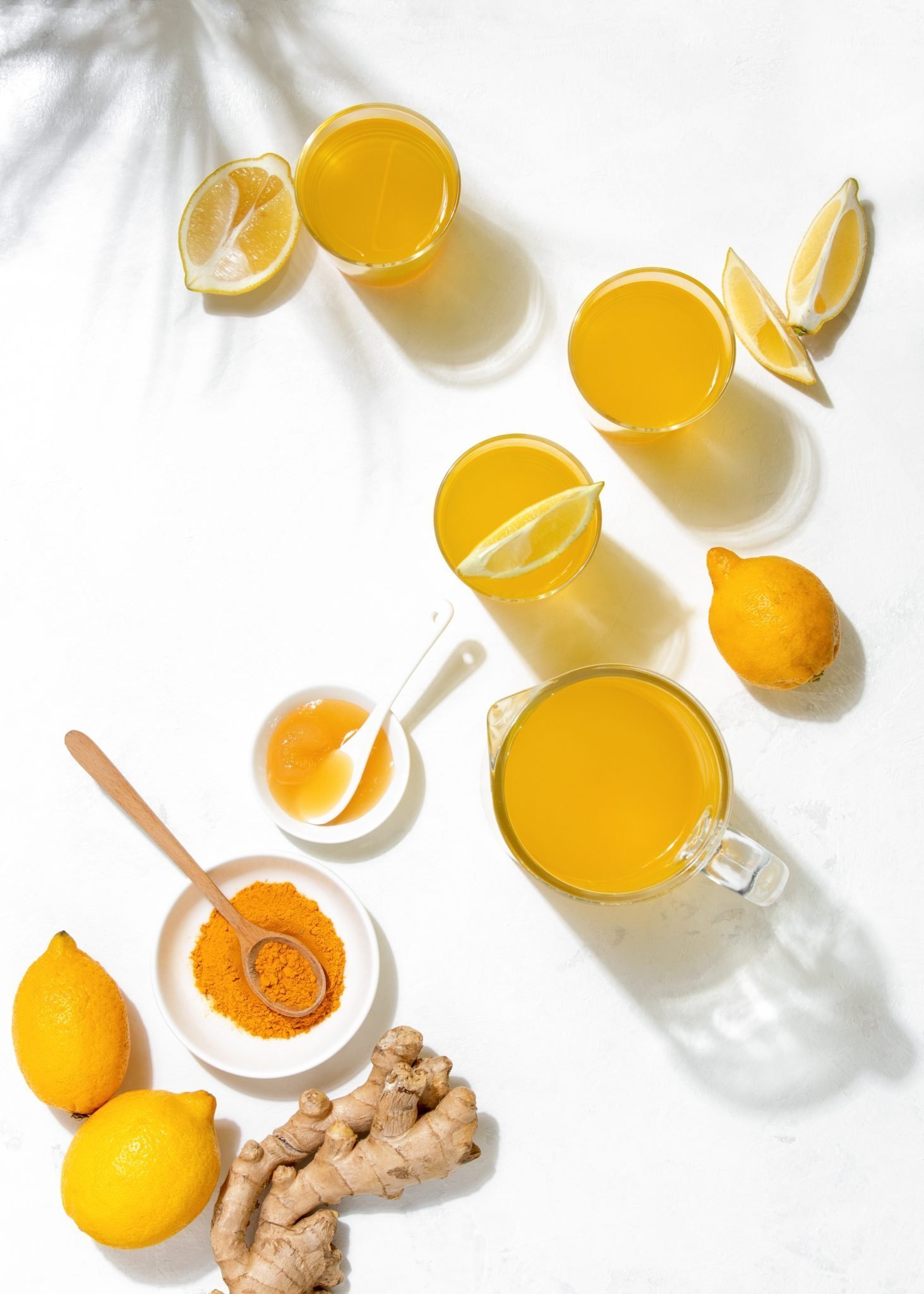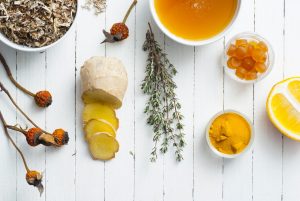I’m Sarah, a Naturopathic Doctor, wellness enthusiast and health-foodie. I’m a well-being advocate and green kitchen guru who is living my true purpose while guiding patients through their personal health journeys. I’m also a complete and utter health food fanatic who wants to see everyone benefit from eating healing foods!
November 15, 2019 By Sarah White No Comments

It’s literally my job to hang out with sick people, so you’d better believe that I’ve spent a ton of time experimenting with foods, herbs and supplements to help keep my immune system at it’s best. Truthfully, I first became interested in medicine because I’ve never been a “naturally healthy” person. You know those people that eat whatever they want and never sleep, yet still manage to have great skin, vibrant energy and an incredible immune system? Well … that’s not me. I spent my teens and 20’s constantly exhausted, battling chronic viruses and it’s taken me a long time to figure out what really works when it comes to natural immune support. With the right diet, movement and stress management I’m happy to report that, these days, I’m rarely sick, my skin is awesome and I have more than enough energy to get me through long days at the clinic serving all of you beautiful patients. While vibrant health is not easy for me (thanks mostly to questionable genes; your girl has variant SNPs for IL-6, SOD, GST + MTHFR, oy vey!) I’m able to maintain great health and a strong immune system with a few key additions to my cold weather diet.
If you’ve been following along for a while you already know that I truly believe great health begins in your kitchen. Food is information that you’re delivering to your body 3 – 5 times daily, and you can use it as a tool to fuel your immune system all fall & winter long to help you feel your best. To help you survive cold and flu season I’ve assembled my guide to the top foods, herbs and nutrients to keep you at your absolutely healthiest. Welcome to this doctor’s immune-boosting kitchen:
Bone Broth: Honestly, a few years ago when the broth trend was taking off my initial reaction was ‘ew’ who would want to drink a mug full of bone juice? I’ve since changed my stock-suspicious ways after learning about all of the health benefits associated with drinking bone broth. Grandma wisdom prevails (my girl Ruthie makes the BEST jewish penicillin aka chicken broth); it turns out that there is some solid science to back up the suggestion that drinking broth can indeed help with an infection. Several studies have found that chicken soup actually does ease symptoms of upper respiratory infections since it’s loaded with protein and zinc to support your immune health. We make 2 batches of bone broth weekly in our home, one using leftover organic rotisserie chicken bones and another made from roasted beef bones.
Elderberry Gummies: I make a batch up all natural, gelation-based gummies most Sunday nights. Not only do they help maintain great gut health, which is critical to immunity, they’re also a great way to sneak in extra immune supportive-herbs and supplements. These elderberry based gummies are my go-to gelatin based treat in the fall and winter. Not just delicious, these gummies really do boost your immune system. Studies show that elderberries can reduce cold duration and symptoms because their high flavonoid content binds to the H1N1 human influenza virus as well as the H5N1 avian influenza virus in order to eliminate them from your system more quickly. The best time to supplement with elderberry extract is within the first 48 hours of the onset of flu symptoms; if you catch the virus early enough elderberry can shorten the duration of flu symptoms by an average of four days.
Bone Broth + Turmeric Mussels: Mussels and frites are my absolute favourite fall / winter comfort food. For some reason it feels quintessentially cold weather to curl up with a big bowl of steaming hot mussels + accompanying sweet potato fries for dipping. In additional to being delicious, this recipe makes it onto my list of top immune-supportive functional foods because it contains a hefty dose of vitamins and antioxidants in an immune boosting bone broth base. Mussels are an excellent source of zinc – a commonly deficient nutrient that is implicated in immune surveillance and improves recovery from upper respiratory tract infections. A single serving of these cooked mussels contains your recommended daily requirement of 8mg zinc and also includes anti-viral turmeric and immune-boosting bone broth.
Change of Season Soup: This traditional immune system tonic has been used by herbalists and TCM practitioners for hundreds of years to ease the body into a new season. It’s a Chinese herbal blend that improves resistance to colds and flu and also helps to balance the body during periods of stress. The original recipe is a combination of 4 “tonifying” herbs that helps your body acclimatize to new temperatures by strengthening the lungs and boosting the immune system. While effective, the herbs used in this soup are frankly quite unappealing on their own. To improve the taste (and patient compliance) I’ve enhanced the traditional recipe with some tasty little extras. My version contains anti-inflammatory spices to improve flavour, along with medicinal mushrooms and nurturing bone broth to help prepare the immune system for weather fluctuations that come with early winter.
Medicinal Mushroom Soup: This nourishing mushroom + bone-broth based soup is the ultimate fall comfort food. Not only is it warming, satisfying and delicious, it also has incredible immune stimulating and healing properties. Mushrooms, specifically the shiitakes found in this recipe, contain compounds called beta-glucans; naturally occurring polysaccharides found in the cell wall of certain fungi. These polysaccharides stimulate immune cells called macrophages, cytokines and natural killer cells to improve you body’s anti-body response and increase your natural immune surveillance.


Garlic: Garlic contains natural compounds that have been shown to improve you body’s ability to fight off the virus that causes colds and flus by up regulating the function of your white blood cells. Studies prove that high doses of garlic can reduced the likelihood of getting sick by 63%. Already feeling unwell? Another study determined that garlic can reduce the duration of an illness by 61%. Garlic is one of the main ingredients in my DIY cough syrup but can just as easily be thrown into any savoury food – salad dressings and soups are two of my go-to garlic delivery options.
Honey: Delicious and soothing, researcher indicates that raw local honey is more effective than over the counter cough syrups at relieving throat pain. Honey also contains a ton of naturally occurring antiviral and antibacterial properties to naturally boost the immune system. My immune-boosting tea to drink when I’m feeling under the weather contains 1 tsp Manuka honey, 1 tbs freshly grated ginger and the juice from 1/2 a lemon. Lemon juice adds additional vitamin C to your brew, while ginger can help reduce inflammation and support the immune system. (Caution: avoid giving unpasteurized honey to infants).
Mushrooms: Medicinal mushrooms are this doctor’s favourite immunity secret weapon. Did you know there’s a 2400-year-old giant mushroom in Oregon that covers over 2200 acres? In addition to being huge, and older than the dinosaurs (scientists believe that the earth was covered by giant mushrooms long before trees showed up), mushrooms have some very special immune-supportive properties. Most mushrooms are rich in polysaccharides called beta-glucans. These sugars, found in the cell wall of mushrooms, have been shown to increase your Th1 immune system activity; the part of your immune system responsible for defending your body from bacteria and viruses. They also stimulate immune cells called macrophages, cytokines and natural killer cells to improve you body’s anti-body response and increase your natural immune surveillance.
Sauerkraut or Kimchi: Cabbage is a cruciferous vegetable that is low in calories, but high in immune-boosting nutrients like vitamin C – about 37mg per 100g of cabbage! I love throwing cabbage into my stir fries along with a handful of medicinal mushrooms as a healthy weeknight dinner in the fall and winter but this immune super veg is even better for you when it’s fermented. Sauerkraut and kimchi are two different forms of fermented cabbage with the main difference being the flavour profile (kimchi tends to be spicier and a bit more flavourful). Fermented cabbage is rich in beneficial bacterial to help keep your gut flora balanced, a good idea when you consider the fact that 70% of your immune system cells live in your digestive system. I try to include at least one serving of fermented foods into my diet each day during the fall and winter to keep me gut & immunity in tip-top shape. You can either purchase premade ferments in the fridge section of your local health food store, or check out my recent Fermenting 101 post where I give you all the best tools and recipes to make fermenting easy, fun and safe for beginners.

Studies show that zinc supplementation can shorten the duration and severity of upper respiratory tract infections and enhance your immune function. Even mildly low levels of zinc can impair your immune function leaving your more vulnerable to colds and flus. Zinc supplements, while effective, can be tough on the digestive system so I typically recommend that my patients take in small frequent doses of this immune boosting nutrient from their diet. Here are some top food sources of zinc:
Carotenoids are a type of yellow/orange pigment found in a number of plants. Carotenoids & vitamin A help to regulate your immune system by increasing overall immune accuracy and surveillance. Studies show that vitamin A and zinc work even better when they’re eaten together in the diet so try combining some of the above zinc-rich foods with the following carotenoid-based choices:
There’s some evidence that vitamin C may be particularly helpful in boosting the immune system of people experiencing stress (so, all of us). Vitamin C is a cheap and safe addition to your medicine cabinet since it acutely supports the immune system during cold and flu season. As with any supplement, check with your Naturopathic doctor first, but studies show that between 500-1000 milligrams every 2 hours is effective at shortening the duration of upper respiratory tract infections. I also recommend adding more of the following food rich in vitamin C to your diet this time of year.
I'm so excited to share this recipe for an easy DIY herbal medicine that we could all use this time of year. This homemade cough syrup is a staple for so many herbalists and naturopathic doctors because it works and is incredibly easy to make. Made from ginger, garlic and turmeric this sweet remedy is anti-viral, immune-boosting and helps to soothe a sore throat.
Fill a mason jar with your garlic, turmeric and ginger and cover with liquid honey. Leave the jar out on the counter for 2 - 3 days to allow the mixture to infuse, then move to the fridge where it can keep for up to 1 month. Take 1 tsp of the honey mixture every few hours at the first sign of a sore throat, or take 1 tsp daily as prevention.
Warning: do not give raw honey to babies <1 years old.
If you have more questions, or are interested in a customized natural immune-health protocol you can book your first visit online here.
This information is not intended as a substitute for the advice provided by your Naturopathic doctor or primary care physician. Do not use the information in this document for diagnosing or treating a health problem or disease. Always speak with your Naturopathic doctor before taking any medication or nutritional or herbal or using any treatment for a health problem. If you have or suspect that you have a medical problem, contact your health care provider promptly. Do not disregard professional medical advice or delay in seeking professional advice because of something you have read online.

Dr. Sarah White is a Naturopathic Doctor, Integrative health expert and the founder + CEO of This Doctor’s Kitchen — your evidence-based resource for all things health and wellness. Dr. Sarah takes a food-first approach to health with a focus in fertility, longevity and natural beauty. She is recognized as an expert in women’s hormones, thyroid health and anti-aging. Dr. Sarah is a published health author with features in Elle Canada, Best Health, EcoParent & Whole Family magazine.